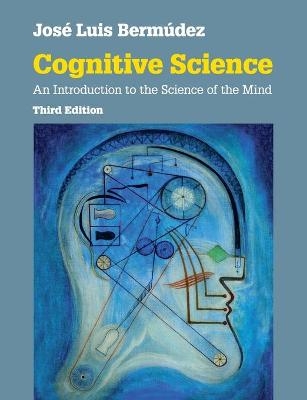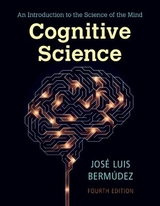
Cognitive Science
Cambridge University Press (Verlag)
978-1-108-44034-9 (ISBN)
The Third Edition of this popular and engaging text consolidates the interdisciplinary streams of cognitive science to present a unified narrative of cognitive science as a discipline in its own right. It teaches students to apply the techniques and theories of the cognitive scientist's 'toolkit' - the vast range of methods and tools that cognitive scientists use to study the mind. Thematically organized, Cognitive Science underscores the problems and solutions of cognitive science rather than more narrowly examining individually the subjects that contribute to it - psychology, neuroscience, linguistics, and so on. The generous use of examples, illustrations, and applications demonstrates how theory is applied to unlock the mysteries of the human mind. Drawing upon cutting-edge research, the text has been substantially revised, with new material on Bayesian approaches to the mind and on deep learning. An extensive on-line set of resources is available to aid instructors and students alike. Sample syllabi show how the text can support a variety of courses, making it a highly flexible teaching and learning resource at both the undergraduate and graduate levels. Instructor and student resources available at https://www.bermudezcogsci.com/
José Luis Bermúdez is Dean of the College of Liberal Arts and Professor of Philosophy at Texas A & M University. He has been involved in teaching and research in cognitive science for over fifteen years, and is very much involved in bringing an interdisciplinary focus to cognitive science through involvement with conference organization and journals. His 100+ publications including the textbook Philosophy of Psychology: A Contemporary Introduction (2005) and a companion collection of readings, Philosophy of Psychology: Contemporary Readings (2006). He has authored the monographs The Paradox of Self-Consciousness (1998), Thinking without Words (2003), and Decision Theory and Rationality (2009) in addition to editing a number of collections including The Body and the Self (1995), Reason and Nature (2003), and Thought, Reference, and Experience (2005).
Part I. Historical Landmarks: 1. The prehistory of cognitive science; 2. The discipline matures: three milestones; 3. The turn to the brain; Part II. Models and Tools: 4. Physical symbol systems and the language of thought; 5. Neural networks and distributed information processing; 6. Applying dynamical systems theory to model the mind; 7. Bayesian models in cognitive science; 8. Modules and architectures; 9. Strategies for brain mapping; Part III. Applications: 10. Models of language learning; 11. Object perception and folk physics; 12. Machine learning: from expert systems to deep learning; 13. Exploring mindreading; 14. Mindreading: advanced topics; 15. The cognitive science of consciousness; 16. Situated cognition and robotics.
| Erscheinungsdatum | 30.01.2020 |
|---|---|
| Zusatzinfo | Worked examples or Exercises; 9 Tables, black and white; 143 Plates, color |
| Verlagsort | Cambridge |
| Sprache | englisch |
| Maße | 190 x 246 mm |
| Gewicht | 1000 g |
| Themenwelt | Geisteswissenschaften ► Psychologie ► Allgemeine Psychologie |
| Geisteswissenschaften ► Psychologie ► Verhaltenstherapie | |
| ISBN-10 | 1-108-44034-7 / 1108440347 |
| ISBN-13 | 978-1-108-44034-9 / 9781108440349 |
| Zustand | Neuware |
| Informationen gemäß Produktsicherheitsverordnung (GPSR) | |
| Haben Sie eine Frage zum Produkt? |
aus dem Bereich



